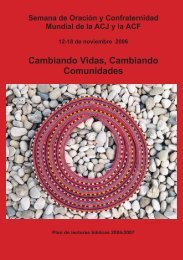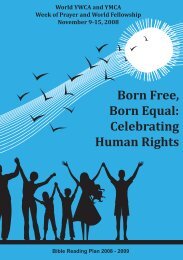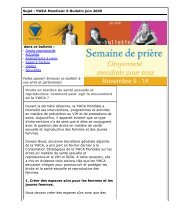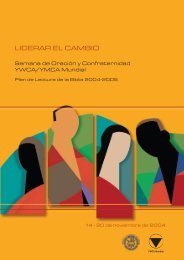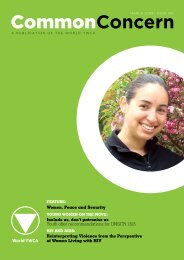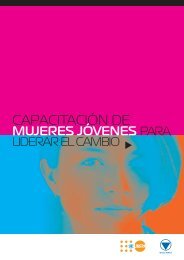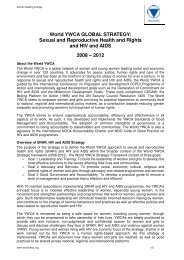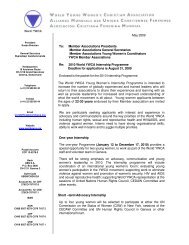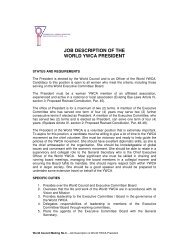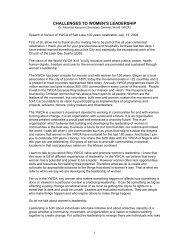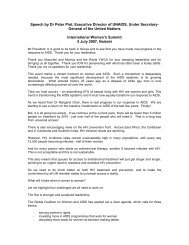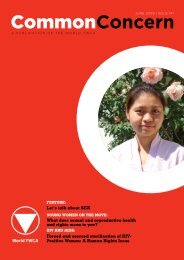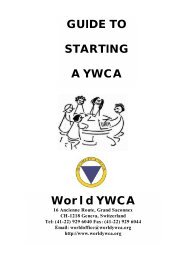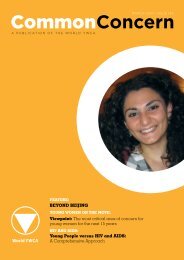If I kept it to myself - World YWCA
If I kept it to myself - World YWCA
If I kept it to myself - World YWCA
Create successful ePaper yourself
Turn your PDF publications into a flip-book with our unique Google optimized e-Paper software.
<strong>If</strong> I <strong>kept</strong> <strong>it</strong> <strong>to</strong> <strong>myself</strong><br />
supported me in many ways, including providing<br />
access <strong>to</strong> Antiretrovirals, when I needed them,<br />
as these medications where not yet available in<br />
the country. It was at this meeting, that I spoke<br />
for first time <strong>to</strong> an international audience, where<br />
Ms. Bridgett Pickering of On Land production,<br />
(instrumental on the documentary Emma S<strong>to</strong>ry);<br />
approached me <strong>to</strong> run a s<strong>to</strong>ry of my life.<br />
Through this documentary, Namibians across<br />
the country shared my experience as a<br />
young woman living pos<strong>it</strong>ively w<strong>it</strong>h HIV. This<br />
documentary went beyond Namibian and was<br />
translated in Portuguese and other languages. I<br />
was then inv<strong>it</strong>ed <strong>to</strong> neighbouring countries and I<br />
started <strong>to</strong> work w<strong>it</strong>h young people in the region.<br />
I have accomplished much work in Botswana,<br />
as I did work w<strong>it</strong>h Barclays Bank youth caucus<br />
<strong>to</strong>uring throughout Botswana.<br />
In January 1997, I met others and made a<br />
decision <strong>to</strong> un<strong>it</strong>e, supporting each other. In 1998<br />
I met w<strong>it</strong>h David Lush, a wh<strong>it</strong>e Namibian man<br />
living w<strong>it</strong>h HIV and he disclosed is HIV status <strong>to</strong><br />
me. We agreed <strong>to</strong> talk <strong>to</strong> counsellors at the state<br />
hosp<strong>it</strong>al and rally <strong>to</strong>gether those who volunteered<br />
<strong>to</strong> speak, joining w<strong>it</strong>h other PLWHA. A few weeks<br />
later we gathered at his house for a meeting of<br />
affected people. At a follow up meeting, which<br />
was strictly for HIV pos<strong>it</strong>ive people, we shared<br />
our experiences, and realised that we had<br />
particular needs but few resources. It became<br />
apparent that we would need <strong>to</strong> set up a formal<br />
organisation for HIV pos<strong>it</strong>ive people in Namibia.<br />
Supported by AIDS Care Trust (ACT) we put<br />
<strong>to</strong>gether our first event for HIV pos<strong>it</strong>ive people.<br />
About 15 people came and <strong>it</strong> was a fantastic<br />
experience. In<strong>it</strong>ially, we called ourselves Pos<strong>it</strong>ive<br />
Nation. The groups existence was threatened<br />
as the entire group, (except for me) was not<br />
open about their HIV status in public so <strong>it</strong> started<br />
slowing down. As the public started knowing<br />
about the group, because of stigma many<br />
w<strong>it</strong>hdrew from the group, however AIDS care<br />
trust continue <strong>to</strong> support us. We met behind<br />
closed doors and the group started <strong>to</strong> grow<br />
again. The group was renamed Lironga Eparu,<br />
which means, “learn <strong>to</strong> survive” in Rukwangari,<br />
a Namibian language. The inspiration from late<br />
Teresia Masoja who said after an HIV pos<strong>it</strong>ive<br />
result we are learning again how <strong>to</strong> survive.<br />
Lironga Eparu was registered in 1999 as a trust.<br />
In 2000, others and <strong>myself</strong> completed a country<br />
<strong>to</strong>ur where we mobilized and managed <strong>to</strong> recru<strong>it</strong><br />
more HIV pos<strong>it</strong>ive people <strong>to</strong> join us, supported<br />
by VSO-Namibia. By the middle of 2001, we<br />
92<br />
held a strategic planning meeting attended by<br />
representatives of HIV pos<strong>it</strong>ive groups from<br />
around the country. W<strong>it</strong>h the support of AIDS law<br />
un<strong>it</strong>, Ms. Michaela Clay<strong>to</strong>n assisted w<strong>it</strong>h technical<br />
expertise and also co-facil<strong>it</strong>ated the meeting. She<br />
assisted in securing resources for this meeting.<br />
At this meeting we agreed <strong>to</strong> set up a national<br />
association of people living w<strong>it</strong>h HIV. A larger<br />
group endorsed the name Lironga Eparu.<br />
I started at Lironga Eparu as a volunteer<br />
from 1999 <strong>to</strong> 2002. Today I am the national<br />
coordina<strong>to</strong>r and represent HIV pos<strong>it</strong>ive people<br />
on HIV and AIDS governing structures such as<br />
the National AIDS Executive Comm<strong>it</strong>tee (NAEC)<br />
and the Namibia Multi-sec<strong>to</strong>ral HIV and AIDS<br />
Coordinating Comm<strong>it</strong>tee (NAMACOC).<br />
In 1999, the Health Minister, Dr. Libertine<br />
Amathila, planned <strong>to</strong> make AIDS a notifiable<br />
disease. This would, by law, require doc<strong>to</strong>rs <strong>to</strong><br />
disclose a patient’s HIV status <strong>to</strong> their relatives.<br />
David Lush, three others and <strong>myself</strong> (all HIV<br />
pos<strong>it</strong>ive) went <strong>to</strong> see the Minister of health. The<br />
Minister was exc<strong>it</strong>ed <strong>to</strong> meet w<strong>it</strong>h PLWHA and<br />
we had a fru<strong>it</strong>ful meeting. We were asked <strong>to</strong><br />
draft some guidelines on how we felt the ministry<br />
should handle the issue of confidential<strong>it</strong>y and<br />
notification. We were successful and this did not<br />
become a law in Namibia.<br />
A huge project began as various organisations<br />
pooled their supporters <strong>to</strong> wr<strong>it</strong>e a draft policy on<br />
confidential<strong>it</strong>y and notification for the government.<br />
We included the Internet forum af-aids in our<br />
discussions. The AIDS Law Un<strong>it</strong> (ALU) of the<br />
Legal Assistance Centre also became involved<br />
holding workshops and discussion forums across<br />
the country. The policy, drafted by ALU, w<strong>it</strong>h<br />
contributions from HIV pos<strong>it</strong>ive people and other<br />
organisations was adopted by Cabinet in 2002.<br />
Although the current policy has been heralded<br />
for balancing public health prior<strong>it</strong>ies w<strong>it</strong>h the<br />
need <strong>to</strong> protect the rights of PLWHA, <strong>it</strong> appeared<br />
<strong>to</strong> have had lim<strong>it</strong>ed impact. In 2003 Lironga<br />
Eparu conducted a study called The Treatment<br />
Consultation, which revealed that HIV pos<strong>it</strong>ive<br />
people experienced severe discrimination and<br />
breaches of confidential<strong>it</strong>y in government clinics<br />
and hosp<strong>it</strong>als around the country.<br />
I believe that engaging religious and trad<strong>it</strong>ional<br />
leaders on HIV and AIDS issues is imperative<br />
in helping commun<strong>it</strong>ies deal w<strong>it</strong>h stigma and<br />
discrimination. I spearhead many commun<strong>it</strong>y<br />
activ<strong>it</strong>ies bringing <strong>to</strong>gether leaders and HIV<br />
pos<strong>it</strong>ive people <strong>to</strong> confront matters of importance.<br />
In September 2001, a group of more than 100<br />
HIV pos<strong>it</strong>ive people gathered in Kavango <strong>to</strong> make<br />
their HIV status public. We organised this his<strong>to</strong>ric



